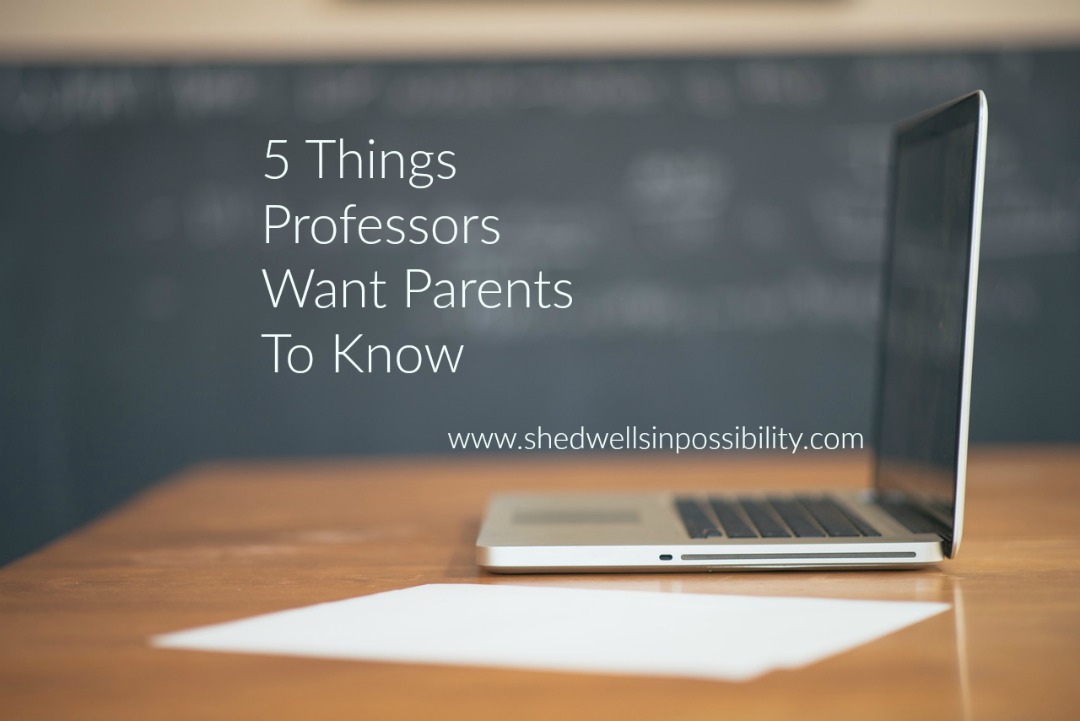This is the third post in a series aimed at the parents of college students. I invite you to read posts one and two as well.
I can say without hesitation that becoming a parent made me a better professor. When I look at the students in my classroom, I see most of them as somebody’s child. I understand that their behavior is a reflection of something, good or bad, that happened to them long before we met. And I understand that my relationship with this student will shape the relationships they’ll have with their families when they go home again. That’s a huge responsibility, and I take it seriously.
As both a parent and professor myself, here are the five things I can tell you that professors really want parents to know.
Your student won’t always tell you the truth about what’s going on in class.
Many people assume that professors were always excellent students and therefore just can’t sympathize with those who struggle. For my own part, I can say that absolutely isn’t true. In high school, I got by on modest effort; in college, I blamed my professors when the same level of effort didn’t produce the results I’d grown accustomed to. Their expectations were too high! Their grading standards were ridiculous! That pattern continued until the middle of my sophomore year, when I realized that making a better effort really did lead to better grades.
Students often blame the professor when they’re struggling. While it’s true there are poor professors at every university, the most helpful thing you can do is ask what your student is doing to improve. Commiserating just encourages your student to believe their academic success is beyond their control.
Professors won’t prevent your student from making bad choices.
Setting up a syllabus is a lot like establishing parental boundaries–the same basic principles are at work in both cases. I set up expectations; I clarify the consequences; and students make choices with that information in mind. Then it’s my job to enforce those consequences, just as I would with my own kids.
It is not my job to prevent your student from making bad choices. College is set up as a place where students can learn to deal with the consequences of their actions; removing those consequences ensures that they’ll never grow up to be responsible adults. If your student is dealing with a negative outcome, don’t encourage them to ask for an exception. Instead, brainstorm with them to figure out how they can avoid that outcome in the future.
We’re on their side, and sometimes that means we can’t be on yours.
As a professor, it’s my job to help students figure out how to articulate their own ideas–not tell them what to think. So if your college student comes home saying something you disagree with, it’s not because I’ve filled their head with crazy ideas. It’s because I’ve helped your student figure out how to articulate what they believe. It might be the first time you’re hearing this from them, but that doesn’t mean it’s the first time the thought has crossed your kid’s mind.
Plenty of students voice opinions I disagree with. Nevertheless, it’s my job to help them figure out how to express those opinions in logical ways. I have to be on their side, whether we agree or not. So don’t blame me for their opinions, because I might not even share them.
We’re really not trying to be difficult.
If you call or email me with concerns, chances are I won’t reveal anything very specific. In fact, FERPA regulations make it illegal for me to discuss specifics with a parent without their student’s consent.If your student doesn’t want you to know something, my hands are tied. But even if I have their consent, I’m not required to tell you anything. FERPA says that I may, not that I must.
I treat my students as adults in the classroom, holding them–not you–accountable for their choices. And in spite of the fact that, as a parent myself, I know my 18 year old wasn’t really an adult, I can’t have it both ways: either I treat college students as grownups, or I treat them as kids. Talking to their parents constitutes treating them as kids.
So, as a general policy, I don’t. I get that you might be paying the bills, but that’s your choice. And it has nothing to do with me.
Most professors genuinely care about your kids.
If your student isn’t doing well in my classes, I want to know why. Sometimes students aren’t interested in sharing the details of their lives with their professors, and that’s understandable. Still, I’ll do what I can to help.
Case in point: one semester, I had a student who came to class with the hood of his sweatshirt pulled down across half his face. He’d stare at the desk in front of him throughout class, rarely looking up. It was clear that this kid had been so beaten down by the circumstances of his life–whatever they were–that he’d given up on even trying to face them.
I spent that entire semester asking for this student’s comments, making a point of noting when I agreed with something he’d said and praising his insightful observations. Gradually, the hood moved to his shoulders. Then the student began to speak up without prompting. He even smiled occasionally. I never learned what he’d been dealing with, but I could see that he was moving past it. I hoped that I’d been of some help as he did.
I’m not unusual among my colleagues. I’ve spent 30 years watching college students struggle through that difficult first year, and the one thing I can say for sure is this: the vast majority of professors really want their students to succeed. Watching that happen is the most satisfying part of a pretty difficult job.





No Comments